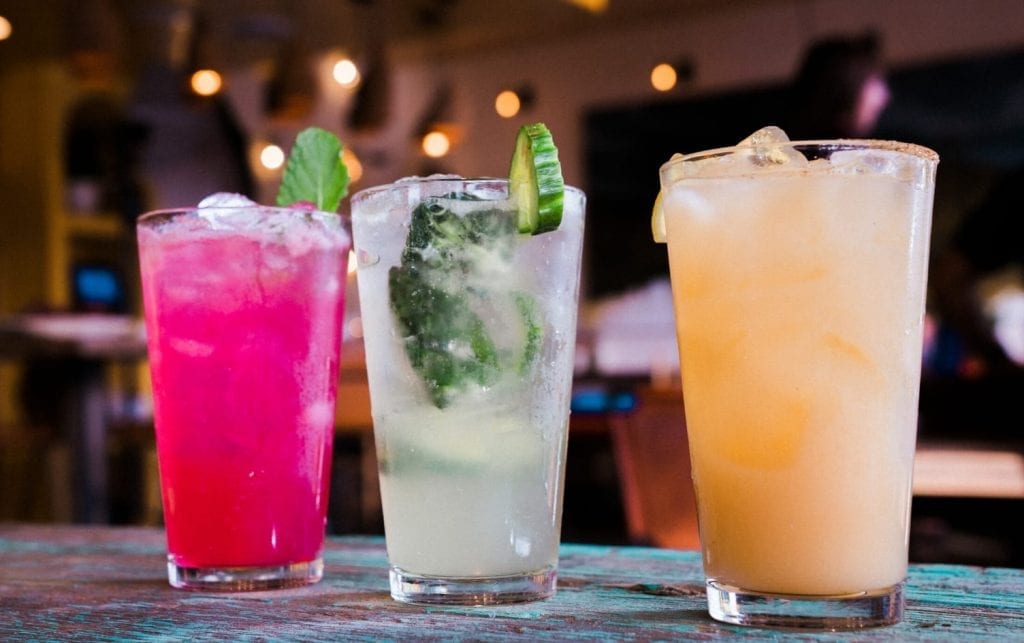How to Eat and Drink Differently During a Heat Wave

Summer is here—and so are the heat waves.
Heat waves are periods when temperatures are higher than normal in an area. For many, it seems like it’s time to stay indoors and get some fresh air. But heat waves can cause real health risks.
Exposure to extreme temperatures can cause dehydration, heatstroke, heartburn, and even cardiovascular and respiratory problems. Science also shows that it can have a big impact on how you sleep, move, and—our favorite topic—how you eat.
According to some studies, people tend to eat less because they don’t feel like eating on hot summer days. This is caused by the hypothalamus, the part of your brain that controls your body temperature and hunger signals. As heat causes your body temperature to rise, your hypothalamus works harder to cool you down. And because digestion causes heat, the hypothalamus suppresses cravings and hunger pangs.
It’s still important to fuel your body with the right foods and drinks, even though heat can affect your mood and energy.
“Planning meals and snacks or keeping cool snacks is a great way to stay fueled,” explains MyFitnessPal registered physician Joanna Gregg. “Being proactive about your diet can help you avoid low energy and feeling distracted, tired, or irritable. For example if you usually eat lunch make sure you have a plan for lunch, whether you feel hungry or not. Even a snack will help!”
But what exactly should you eat and drink in the heat? In general, if you eat a balanced diet, anything is fair game. There are other food and drink options that may be better for supporting your body through heat waves, however.
What to Eat and Drink During a Heat Wave
Water, water, water
We thought we’d start this list, but we’re stating the obvious.
“When it’s hot, our bodies sweat a lot to cool down and that’s why we need to drink a lot of fluids on hot days,” explains Gregg. “It is not common to drink too much water. Our bodies have a built-in mechanism that triggers thirst when we need water, so being aware of that feeling and drinking when you feel thirsty is best.”
Men should aim for 15.5 cups (125 ounces) of fluid per day; women should aim for 11.5 cups (91 ounces) per day.
That may sound like a lot but “any drink that contains a lot of water is great for hydration. “Just try to avoid drinks with too much sugar,” suggests Gregg.
Fun fact: By 2023, MyFitnessPal members are logging over 5B cups of water! Start logging your water now.
Fruits and vegetables
Fruits and vegetables are a great natural source of water. “Their water content is what allows them to be consumed in greater volume with fewer calories,” explains Gregg. “My favorite summer picks are watermelon, cucumbers, oranges, strawberries and tomatoes.”
Throw any of these into a cooler or as a snack on the go to keep yourself full and hydrated during the hotter months. You can also add fruit to your water for a natural flavor!
Cold (and hydrating!) treats
“Cold snacks are a great way to keep the heat at bay,” says Gregg. “And anything with fruits and vegetables will have a good amount of water and vitamins and minerals to help with hydration.”
Need ideas? Try celery with peanut butter, yogurt and strawberries, watermelon or grapes with string cheese, or cottage cheese with cucumber.
Some Healthy Eating Tips to Survive the Heat Wave
Cut down on alcohol
Alcohol and caffeine are often believed to cause dehydration but Gregg says there really isn’t much hard evidence to support these claims.
“If you drink alcohol or sugary drinks instead of water, however, it can cause a disturbance in your hydration status and increase urination.”
Reducing the amount of these drinks consumed and focusing mainly on drinking water is best.


Enjoy Meat in Moderation
Meat sweating is not scientifically proven, but eating a lot of meat can increase your body temperature, although most people probably won’t notice a significant change.
“Digesting food creates energy and heat. “Digesting protein, in particular, requires more energy to break down compared to fat and carbohydrates,” says Gregg. “Unless you eat a lot of meat and notice that your body temperature is affected, you can continue to eat meat. But, if you’re concerned about your body temperature, you might consider eating smaller portions or try plant-based protein.”
A Balanced Diet Should Meet Your Electrolyte Needs
The average person who eats a well-balanced diet probably gets enough electrolytes from food. Electrolyte replacement is only necessary if you sweat excessively due to increased humidity or activity.
If so, Gregg says hydration tablets like Nuun are a good quick way to replenish electrolytes.
“When choosing an electrolyte replacement drink look for water, electrolytes—such as sodium, potassium, magnesium and calcium—and additional minerals. Calories from carbohydrates should be around 6-8%.
For everyday activities—think: yard work and walking the dog—as well as low-intensity activity that lasts less than an hour and results in less sweating, “sports drinks with lower sodium levels will replenish your stores,” Gregg suggests. “Make sure the one you choose has low sodium levels. Some pills and sticks are 500-1000 mg sodium which is not really necessary unless you are exercising outside and losing a lot of fluid/sweat.”
The Bottom Line
Listen to your body and let it call the shots.
“Paying attention to your body and your hunger and thirst cues is the best way to keep your body functioning properly without overheating,” says Gregg.
Stay cool and balanced (in nutrition and health)!
Source link




